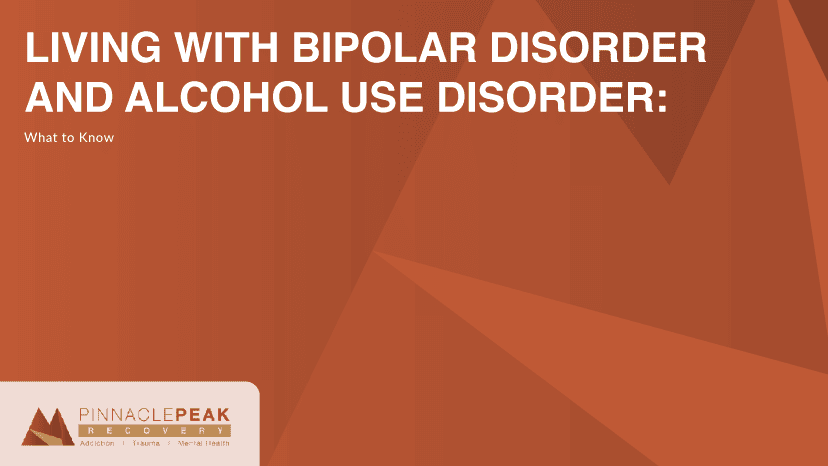If you live with bipolar disorder, regardless of the specific type, you have experienced the intense highs and lows associated with the condition. One of the most difficult parts of dealing with bipolar disorder is the changes in behavior that occur when you are experiencing mania or depression.
When bipolar goes untreated, these changes in behavior can be life-altering. Someone in a manic episode might spend large amounts of money, leave their job, or uproot their life. People in a depressive episode, on the other hand, might experience difficulty trying to get out of bed, socially isolate themselves, or stop showing interest in activities they typically enjoy.
Unfortunately, Arizona ranks 47th in the nation for access to mental healthcare. And the truth is, when a serious mental health condition like bipolar disorder goes untreated, other conditions begin to crop up. This is one of the reasons alcohol use disorder (AUD) often co-occurs with bipolar disorder.
At Pinnacle Peak, we are proud to provide nationally recognized, evidence-based treatment options so that we ensure clients have a full continuum of care and we can meet each person’s individual needs. We are prepared to help people who are dealing with multiple conditions at the same time. So, let’s break down the connection between alcohol and bipolar disorder.
The Relationship Between Alcohol And Bipolar Disorder: Finding the Link
There is a strong relationship between AUD and bipolar disorder, in fact, as much as 48% of Americans with bipolar disorder also have AUD.
One of the reasons that people with bipolar disorder develop AUD is because they are attempting to self-medicate or cope with symptoms by drinking alcohol. Alcohol can help to numb intense feelings in the short term, but in the long term, alcohol is likely to worsen symptoms of bipolar, like depression and mania, and create a vicious cycle.
However, it is important to recognize that an attempt to self-medicate is not the exclusive reason that people with bipolar disorder drink alcohol. People who are experiencing a manic, depressive, or mixed episode often present with shifts in behavior that cause them to make risky or destructive decisions that they would not commonly participate in.
Someone who is experiencing a manic state is typically much more social and excitable than they would be regularly. It is not uncommon for someone in this state to want to go out and party. In this case, they may try to keep the good times going by drinking alcohol or taking other substances. Unfortunately, this can make their decision-making skills even worse while they are in an already impaired state, leading to increasingly dangerous or destructive situations.
Alcoholism and Bipolar Disorder Symptoms: What Do They Look Like?
It is important to be able to recognize the symptoms of both AUD and Bipolar to understand how the two might overlap.
Bipolar disorder is usually defined by the symptoms of mania, hypomania, and depression. Bipolar I often has more manic symptoms, whereas Bipolar II and cyclothymic disorder have more depressive symptoms and hypomanic symptoms.
Manic symptoms can look like:
- Decreased need for sleep
- Extreme excitability or jumpiness
- Increased risk-taking behavior, like unprotected sex
- Racing disconnected thoughts
- Rapid or illegible speech
- Being highly irritable or easily frustrated
- Unfounded belief that they are famous or somehow important
Hypomania often presents similarly but does not last as long and typically is not intense enough to impact a person’s ability to participate in daily functions like work or school.
Depressive symptoms might look like:
- Slowed processing or difficulty connecting with those around them
- Low concentration or ability to remember important details
- Getting too much or too little sleep
- Lack of interest in activities that they typically enjoy
- Plans or actions of self-harm
- Suicidal ideation
- Lack of motivation to complete tasks
- Feelings of worthlessness
Symptoms of bipolar can be worsened by alcohol, often making the manic highs higher and the depressive lows lower.
AUD symptoms often look like this:
- Experiencing withdrawal when you stop drinking alcohol
- Drinking under unsafe conditions, such as when you need to drive
- Hiding alcohol or concealing the extent of your alcohol consumption
- Having a difficult time trying to cut back your drinking, despite repeated efforts
- Craving alcohol
- Drinking despite negative impacts on your work, relationships, or other responsibilities
- A high tolerance for alcohol before noticing its effects
- Drinking instead of participating in hobbies or activities that you used to enjoy
- Drinking regularly despite the negative interactions alcohol has with health concerns, mental health conditions, or medication
Self-Medicating Bipolar Disorder with Alcohol: Why It Doesn’t Work
When someone is self-medicating bipolar disorder with alcohol, they are trying to mitigate or ignore their symptoms by numbing themselves. Even among people who do not have a mental health condition, alcohol is commonly utilized as a tool to relax and unwind at the end of the day. For people with a mental health condition like bipolar disorder, that can quickly get out of hand.
Like medication for bipolar disorder, alcohol has an effect on the central nervous system. Alcohol helps the body relax, and for some can slow racing thoughts, making life more tolerable in the short term. However, this can quickly snowball into poor decisions, isolation, and worsening health.
While someone who is experiencing co-occurring AUD and bipolar disorder may believe that their symptoms are more tolerable when they drink, the truth is that alcohol use often worsens the very same symptoms that they are trying to treat. When drinking in a manic state, this can look like increasingly erratic behavior, or even some psychotic symptoms, like delusions.
Here at Pinnacle Peak, we know the impact this can have on the individual, and the whole family, which is why we create a comfortable atmosphere with family therapy options. This way we ensure that the whole family can learn and grow through this difficult experience.
The Consequences of Mixing Alcohol With Bipolar Disorder Medication
Mixing alcohol with bipolar medication can be extremely dangerous, and is never recommended. Both alcohol and bipolar medications impact the central nervous system and therefore can create severe negative reactions and even impairments. One of the major concerns about mixing alcohol and bipolar medication is that doing so can reduce the effectiveness of the medication and lead to a relapse in symptoms of the disorder.
One of the most common medication types typically prescribed to treat bipolar disorder is
mood stabilizers.
The most common mood stabilizer is lithium. However, anticonvulsants and antipsychotics are commonly used to treat bipolar as well.
The effects of mixing alcohol and bipolar medication may differ slightly depending on the specific medication, but the mix typically includes short-term consequences like:
- Drowsiness
- Memory problems
- Increased depressive symptoms
- Dizziness
- Dry mouth
- Blurred vision
- Nausea or vomiting
- Difficulty sleeping
- Difficulty operating machinery
- Fatigue
- Muscle pain and stiffness
In the long term, mixing alcohol and bipolar medication can cause serious and even irreversible damage to the renal system and liver. Both alcohol and these medications individually are hard on the body, but together they cause damage much more quickly.
Finding Dual Diagnosis Treatment in Arizona
People looking to begin treatment are often worried about the quality of care they will receive, especially when multiple components contribute to their health concerns. That’s why at Pinnacle Peak, we are proud to provide a very comfortable facility with engaged alumni, so you know that recovery truly is possible.
If you are living with AUD in addition to bipolar disorder, you may be a good fit for dual-diagnosis treatment. This simply means seeking treatment for two conditions that often play into each other simultaneously.
It is common for dual-diagnosis treatments to focus on therapy while supplementing treatment with medication when appropriate.
Two of the most common forms of therapy for dual-diagnosis are Cognitive Behavioral Therapy (CBT) and Dialectical Behavioral Therapy (DBT). CBT is designed to help patients understand the relationship between their thoughts, feelings, and behaviors. DBT, on the other hand, is more focused on managing big feelings, regulating emotions, and tolerating distress without acting out in ways that are harmful to themselves or others.
If you are ready to start getting treatment for AUD, bipolar disorder treatment, or just looking for more information, Pinnacle Peak Recovery is here for you. Start working on a safer, healthier tomorrow, today. Just give us a call anytime at (866) 377-4761 and we’ll be excited to get started with your care.
Clinical Excellence | Compassionate Care | Family Feel



